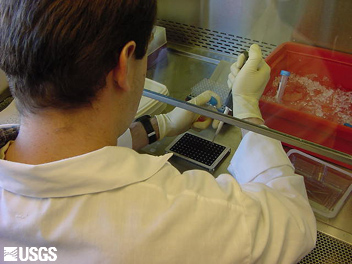- Home
- About S&T
- Taxa/Organisms
- Ecosystems
- Issues
- Methods & Tools
- Reports & Publications
- Location
- Search
Publisher: USGS | Science Center: Western Fisheries Research Center (WFRC, Seattle) | Format: URL
wfrc.usgs.gov — Many diseases of trout and salmon persist in our cultured fish stocks today, despite improvements in fish culture practices and years of research on vaccines and chemotherapeutants. An excellent example is bacterial kidney disease (BKD), caused by the bacterium Renibacterium salmoninarum. Infections by R. salmoninarum are considered by many to be More...

Publisher: USGS | Science Center: Western Fisheries Research Center (WFRC, Seattle) | Format: URL
wfrc.usgs.gov — Bacterial kidney disease (BKD) caused by Renibacterium salmoninarum has been implicated as a significant factor in the 5-year decline of the chinook salmon populations in Lake Michigan that began during 1988. In 1999, researchers at the WFRC began a multi-year study in coordination with Great Lakes fishery biologists to examine the role of BKD in More...

Publisher: USGS | Science Center: Western Fisheries Research Center (WFRC, Seattle) | Format: URL
wfrc.usgs.gov — Bacterial kidney disease (BKD) is caused by Renibacterium salmoninarum and is considered to be the most difficult salmonid bacterial disease to control, in part because of its dual modes of transmission. This bacterium, unlike most other fish pathogens, is transmitted vertically from parent fish to progeny in association with the eggs, as well as More...
